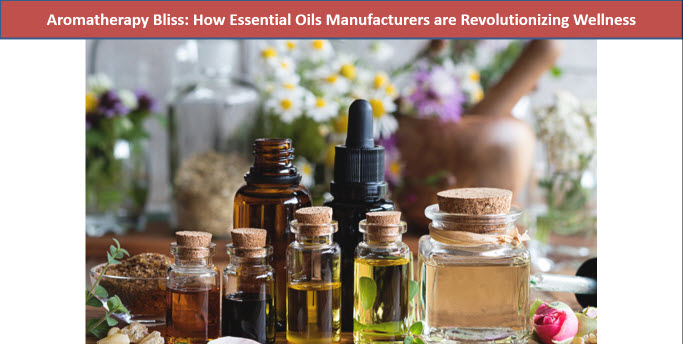Blogs

Aromatherapy Bliss: How Essential Oils Manufacturers are Revolutionizing Wellness
Introduction
In the hustle and bustle of our daily lives, the search for holistic wellness solutions has gained tremendous momentum. One such solution is aromatherapy, and essential oils are at the heart of this soothing and rejuvenating practice. This article delves into the world of aromatherapy and how essential oils manufacturers are at the forefront of revolutionizing wellness.
The Essence of Aromatherapy
Aromatherapy is a therapeutic practice that uses natural essential oils to enhance physical and emotional well-being. The aroma and healing properties of these oils have been harnessed for centuries, and now modern science is shedding light on their numerous benefits.
The Rise of Essential Oils
1. Ancient Origins: Essential oils have a rich history, dating back to ancient civilizations such as Egypt, China, and India. They were valued for their medicinal and aromatic properties, and their use in rituals and ceremonies.
2. Modern Relevance: In recent years, there has been a resurgence in the popularity of essential oils. This resurgence is driven by a growing interest in natural, holistic, and sustainable wellness practices.
Essential Oils: The Manufacturing Process
1. Sourcing the Raw Materials: Essential oils are derived from various parts of plants, including leaves, flowers, bark, and roots. It's essential for manufacturers to source high-quality raw materials to produce potent oils.
2. Extraction Methods: There are several methods of extracting essential oils, including steam distillation, cold-pressing, and solvent extraction. Each method has its advantages and is chosen based on the plant source.
3. Quality Control: Manufacturers must adhere to strict quality control measures to ensure the purity and potency of their essential oils. This includes rigorous testing and adherence to industry standards.
Aromatherapy Benefits
1. Stress Reduction: Essential oils like lavender, chamomile, and frankincense are known for their stress-relieving properties. Inhaling these fragrances can calm the mind and reduce anxiety.
2. Pain Management: Oils such as eucalyptus and peppermint have analgesic properties, making them effective in pain management.
3. Improved Sleep: Many individuals use essential oils like lavender to improve their sleep quality. The soothing aroma can promote relaxation and restful sleep.
4. Mood Enhancement: Citrus oils like lemon and orange can uplift mood and create a sense of positivity and vitality.
The Science Behind Aromatherapy
1. Aromachemistry: Researchers are delving into the complex chemical compositions of essential oils to understand their therapeutic effects better.
2. Psychophysiology: Aromatherapy has a direct impact on the brain and nervous system. It can alter brainwave patterns, affecting mood and cognition.
Sustainability and Ethical Practices
1. Sustainable Sourcing: As consumers become more environmentally conscious, essential oils manufacturers are adopting sustainable practices in sourcing and production.
2. Ethical and Fair Trade: Many manufacturers are involved in fair trade practices, ensuring that the communities that cultivate these plants benefit from their trade.
Aromatherapy in Daily Life
1. Diffusers: Essential oil diffusers have become a household staple. They disperse the aroma throughout the room, creating a relaxing atmosphere.
2. Topical Applications: Essential oils can be diluted and applied topically to the skin for various purposes, including massage, skincare, and pain relief.
Conclusion
Aromatherapy with essential oils is not just a trend but a time-tested holistic approach to wellness. Essential oils manufacturers play a vital role in bringing the benefits of aromatherapy to people worldwide. As science continues to unravel the mysteries behind these fragrant wonders, it's clear that essential oils are here to stay.
Frequently Asked Questions
1. Are essential oils safe to use?
Yes, when used correctly, essential oils are safe for most people. However, it's essential to follow proper dilution and usage guidelines to prevent adverse reactions.
2. How can I choose the right essential oil for my needs?
The choice of essential oil depends on your specific wellness goals. Research and consult with professionals to find the best oil for your needs.
3. Can I ingest essential oils for their benefits?
Ingesting essential oils should be done with extreme caution and under the guidance of a qualified aromatherapist or healthcare professional. Not all oils are safe for internal use.
4. Do essential oils have an expiry date?
Essential oils do not expire, but they can degrade over time. Proper storage, away from heat and light, can extend their shelf life.
5. Can essential oils replace traditional medicine?
While essential oils have therapeutic benefits, they should not replace prescribed medications. They can complement conventional treatments and promote well-being but should not be considered a sole cure for medical conditions.

